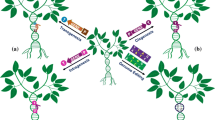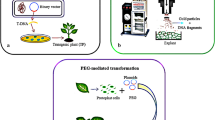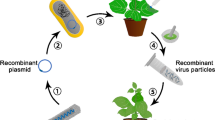Abstract
Key message
This study addresses T-DNA insert stability and transgene expression consistency in multiple cycles of field propagated sugarcane. T-DNA inserts are stable; no transgene rearrangements were observed. AmCYAN1 and PMI protein accumulation levels were maintained. There was no evidence that production of either protein declined across generations and no transgene silencing was observed in three commercial sugarcane varieties through commercially relevant ratooning, propagation-by-setts, and micro-propagation generation processes over 4 years of field testing. Long term transgene expression consistency and T-DNA insert stability can be achieved in sugarcane, suggesting that it is highly probable that transgenic sugarcane can be successfully commercialized.
Abstract
This study addresses T-DNA insert stability and transgene expression consistency in multiple cycles of field propagated sugarcane. These data are critical supporting information needed for successful commercialization of GM sugarcane. Here seventeen transgenic events, containing the AmCYAN1 gene driven by a CMP promoter and the E. coli PMI gene driven by either a CMP or Ubi promoter, were used to monitor T-DNA insert stability and consistency of transgene encoded protein accumulation through commercially relevant ratooning, propagation-by-setts, and micro-propagation generation processes. The experiments were conducted in three commercial sugarcane varieties over 4 years of field testing. DNA gel blot analysis showed that the T-DNA inserts are stable; no transgene rearrangements were observed. Quantitative ELISA showed no evidence of decreasing AmCYAN1 and PMI protein levels across generations and no transgene silencing was observed. These results indicate that long term transgene expression consistency and T-DNA insert stability can be achieved in sugarcane, suggesting that it is highly probable that transgenic sugarcane can be successfully commercialized.









Similar content being viewed by others
Abbreviations
- GM:
-
Genetically modified
- AmCYAN1:
-
Anemonia majano cyan fluorescent protein
- PMI:
-
E. coli phosphomannose isomerase
- CMP:
-
Cestrum yellow leaf curling virus promoter
- Ubi:
-
Maize polyubiquitin1 promoter
- ELISA:
-
Enzyme-linked immuno-sorbent assay
- tNOS:
-
Terminator of nopaline synthase gene
- T0:
-
Plants generated from transformation
- T-DNA:
-
Transfer DNA
- CTAB:
-
Cetyl trimethylammonium bromide
- DIG:
-
Digoxigenin
- NPTII:
-
Neomycin phosphotransferase
- PAT:
-
Phosphinothricin acetyl-transferase
References
Arencibia AD, Carmona ER, Tellez P, Chan M-T, Yu SM, Trujillo LE, Oramas P (1998) An efficient protocol for sugarcane (Saccharum spp. L.) transformation mediated by Agrobacterium tumefaciens. Transgenic Res 7(3):213–222
Bettany AJE, Dalton SJ, Timms E, Morris P (1998) Stability of transgene expression during vegetative propagation of protoplast-derived tall fescue (Festuca arundinacea Schreb.) plants. J Exp Bot 49(328):1797–1804
Birch RG, Bower RS, Elliott AR (2010) Highly efficient, 5′-sequence-specific transgene silencing in a complex polyploid. Trop Plant Biol 3(2):88–97
Borkowska M, Kleczkowski K, Pawelczak A, Wielgat B (1995) Transformation of diploid potato with an Agrobacterium tumefaciens binary vector system. II. Stability of transformation in tubers, micropropagated and greenhouse grown plants. Acta Physiol Plant 17(3):275–280
Bower R, Birch RG (1992) Transgenic sugarcane plants via microprojectile bombardment. Plant J 2(3):409–416
Chen R, Xue G, Chen P, Yao B, Yang W, Ma Q, Fan Y, Zhao Z, Tarczynski MC, Shi J (2008) Transgenic maize plants expressing a fungal phytase gene. Transgenic Res 17(4):633–643
Christensen AH, Quail PH (1996) Ubiquitin promoter-based vectors for high-level expression of selectable and/or screenable marker genes in monocotyledonous plants. Transgenic Res 5(3):213–218
Dong S, Delucca P, Geijskes RJ, Ke J, Mayo K, Mai P, Sainz M, Caffall K, Moser T, Yarnall M, Setliff K, Jain R, Rawls E, Smith-Jones M, Dunder E (2014) Advances in Agrobacterium-mediated sugarcane transformation and stable transgene expression. Sugar Tech 16(4):366–371
Doyle JJ, Doyle JL (1987) A rapid DNA isolation procedure for small quantities of fresh leaf tissue. Phytochem Bull 19(1):11–15
Duan X, Li X, Xue Q, Abo-el-Saad M, Xu D, Wu R (1996) Transgenic rice plants harboring an introduced potato proteinase inhibitor II gene are insect resistant. Nat Biotechnol 14(4):494–498
Fearing PL, Brown D, Vlachos D, Meghji M, Privalle L (1997) Quantitative analysis of Cry1A (b) expression in Bt maize plants, and silage and stability of expression over successive generations. Mol Breed 3(3):169–176
Gilbert RA, Glynn NC, Comstock JC, Davis MJ (2009) Agronomic performance and genetic characterization of sugarcane transformed for resistance to sugarcane yellow leaf virus. Field Crops Res 111(1–2):39–46
Harrison MD, Geijskes RJ, Lloyd R, Miles S, Palupe A, Sainz MB, Dale JL (2014) Recombinant cellulase accumulation in the leaves of mature, vegetatively propagated transgenic sugarcane. Mol Biotechnol 56(9):795–802
Ingelbrecht IL, Irvine JE, Mirkov TE (1999) Posttranscriptional gene silencing in transgenic sugarcane. Dissection of homology-dependent virus resistance in a monocot that has a complex polyploid genome. Plant Physiol 119(4):1187–1198
Ingham DJ, Beer S, Money S, Hansen G (2001) Quantitative real-time PCR assay for determining transgene copy number in transformed plants. Biotechniques 31(1):132–140
Joyce P, Hermann S, O’Connell A, Dinh Q, Shumbe L, Lakshmanan P (2014) Field performance of transgenic sugarcane produced using Agrobacterium and biolistics methods. Plant Biotechnol J 12(4):411–424
Kinkema M, Geijskes J, deLucca P, Palupe A, Shand K, Coleman HD, Brinin A, Williams B, Sainz M, Dale JL (2014) Improved molecular tools for sugar cane biotechnology. Plant Mol Biol 84(4–5):497–508
Kramer C, Brune P, McDonald J, Nesbitt M, Sauve A, Weyhermueller SS (2016) Evolution of risk assessment strategies for food and feed uses of stacked GM events. Plant Biotechnol J 14(9):1899–1913
Lakshmanan P, Geijskes RJ, Aitken KS, Grof CLP, Bonnett GD, Smith GR (2005) Sugarcane biotechnology: the challenges and opportunities. In Vitro Cell Dev Biol Plant 41(4):345–363
LaPaz JL, Pla M, Papazova N, Puigdomenech P, Vicient CM (2010) Stability of the MON 810 transgene in maize. Plant Mol Biol 74(6):563–571
Leibbrandt NB, Snyman SJ (2003) Stability of gene expression and agronomic performance of a transgenic herbicide-resistant sugarcane line in South Africa. Crop Sci 43(2):671–677
Ming R, Moore P H, Wu K-K, Hont AD, Glaszmann JC, Tew T, Mirkov TE, Silva J, Jifon J, Rai M, Schnell RJ, Brumbley SM, Lakshmanan, Comsstock JC., Paterson AH (2006) Sugarcane improvement through breeding and biotechnology. In: Jules Janick (ed) Plant breed reviews, vol 27. Wiley, New York, pp 2–118. [ISBN 0-471-73212-3].
Mudge SR, Osabe K, Casu RE, Bonnett GD, Manners JM, Birch RG (2009) Efficient silencing of reporter transgenes coupled to known functional promoters in sugarcane, a highly polyploid crop species. Planta 229(3):549–558
Negrotto D, Jolley M, Beer S, Wenck AR, Hansen G (2000) The use of phosphomannose-isomerase as a selectable marker to recover transgenic maize plants (Zea mays L.) via Agrobacterium transformation. Plant Cell Rep 19(8):798–803
Oliveira A.L.M, Stoffels M, Schmid M, Reis VM, Baldani JI, Hartmann A (2009) Colonization of sugarcane plantlets by mixed inoculations with diazotrophic bacteria. Eur J Soil Biol 45(1):106–113
Ottaviani MP, ten Cate CH, van Vloten-Doting L (1992) Expression of introduced genes after tuber propagation of transgenic potato plants. Plant Breed 109(2):89–96
Padgette SR, Kolacz KH, Delannay X, Re DB, LaVallee BJ, Tinius CN, Rhodes WK, Otero YI, Barry GF, Eichholtz DA, Peschke VM, Nida KD, Taylor NB, Kishore GM (1995) Development, identification and characterization of a glyphosate-tolerant soybean line. Crop Sci 35(5):1451–1461
Singh B, Yadav GC, Lal M (2001) An efficient protocol for micropropagation of sugarcane using shoot tip explants. Sugar Tech 3(3):113–116
Stavolone L, Kononova M, Pauli S, Ragozzino A, de Haan P, Milligan S, Lawton K, Hohn T (2003) Cestrum yellow leaf curling virus (CmYLCV) promoter: a new strong constitutive promoter for heterologous gene expression in a wide variety of crops. Plant Mol Biol 53(5):703–713
Wei HR, Wang ML, Moore PH, Albert HH (2003) Comparative expression analysis of two sugarcane polyubiquitin promoters and flanking sequences in transgenic plants. J Plant Physiol 160(10):1241–1251
Wenck A, Pugieux C, Turner M, Dunn M, Stacy C, Tiozzo A, Dunder E, van Grinsven E, Khan R, Sigareva M, Wang WC, Reed J, Drayton P, Oliver D, Trafford H, Legris G, Rushton H, Tayab S, Launis K, Chang Y-F, Chen D-F, Melchers L (2003) Reef-coral proteins as visual, non-destructive reporters for plant transformation. Plant Cell Rep 22(4):244–251
Wu H, Awan FS, Vilarinho A, Zeng Q, Kannan B, Phipps T, McCuiston J, Wang W, Caffall K, Altpeter F (2105) Transgene integration complexity and expression stability following biolistic or Agrobacterium-mediated transformation of sugarcane. In Vitro Cell Dev Biol Plant 51(6):603–611
Zhang Y, Yin X, Yan A, Li G, Zhang J (2005) Stability of inheritance of transgenes in maize (Zea mays L.) lines produced using different transformation methods. Euphytica 144(1):11–22
Acknowledgements
We thank Michael Nuccio, David Patton, Tichafa Munyikwa, Emily Smith (produced the graphs 4–9), Doug Russell, Lauren De Carbonnel, Sivamani Elumalai, Anic Deframond and Kasi Azhakanandam for edits, helpful suggestions and comments.
Author contributions
Kerry Hosmer Caffall designed the experiments, did sampling, analyzed the data and drafted the manuscript. Chengkun He coordinated the multiple function groups, performed data analysis, wrote and finalized the manuscript. Michele Smith-Jones designed field experiments, did sampling and edited the manuscript. Kris Mayo, Pearl Mai, Shujie Dong, John Ke, and Erik Dunder conducted sugarcane transformation and edited the manuscript. Michele Yarnall and Rachel Whinna generated protein ELISA data and edited the manuscript. Joe DeMaio and Weining Gu designed Southern blotting experiments, generated the Southern blotting data and edited the manuscript. Judith Sheldon generated the AmCYAN1 protein expression data by confocal microscopy analyses. Martin Allen, Tricia Costello, and Ada Snyder did sampling and assay submission. Kristin Setliff, Rakesh Jain, Clark Lovelady, Erik Rawls, and Erik Palmer provided sugar cane field testing. Yan Zhang, Nicholas Bate, Liang Shi, and Ian Jepson provided the project support and edited the manuscript.
Author information
Authors and Affiliations
Corresponding author
Additional information
Kerry Hosmer Caffall and Chengkun He are the co-first authors.
Electronic supplementary material
Below is the link to the electronic supplementary material.
Rights and permissions
About this article
Cite this article
Caffall, K.H., He, C., Smith-Jones, M. et al. Long-term T-DNA insert stability and transgene expression consistency in field propagated sugarcane. Plant Mol Biol 93, 451–463 (2017). https://doi.org/10.1007/s11103-016-0572-6
Received:
Accepted:
Published:
Issue Date:
DOI: https://doi.org/10.1007/s11103-016-0572-6




